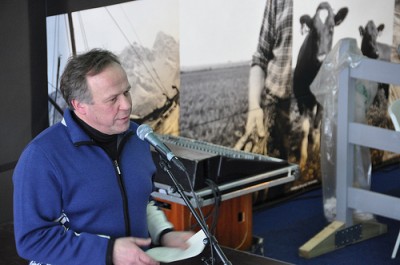Even though they’ve been ridiculed through worldwide coverage of Norway’s butter shortage, and faced with a lack of one of the most essential items of the holiday season, local officials won’t ease the strict and protectionist agricultural policies that allowed the shortage to occur. Calls to break up the country’s butter monopoly are meeting deaf ears.

Agriculture Minister Lars Peder Brekk of the farmer-friendly Center Party claims this is “not the time” to discuss market conditions that protect Norwegian agricultural products and regulate their supply and price. “No, the market regulations are important to uphold long-term stability in the production of food in Norway,” Brekk told newspaper Aftenposten.
Politicians and government officials in charge of Norway’s strict policies that support Norwegian producers and keep cheaper foreign competition out of the market have otherwise been fairly quiet during the butter shortage that has made headlines and newscasts all over the world. They’ve mostly allowed dairy cooperative Tine, as so-called “market regulator,” to take the heat for the shortage they prefer to blame on a boost in demand tied to a low-carbo diet fad – not on the fact that Tine waited too long to take steps to boost production and allow imports into the market.
“For the first time in 30 years, the Norwegian market for butter hasn’t been covered, which is first and foremost blamed on increased demand,” Brekk claimed. “There’s not a speck of any foundation for changing market arrangements based on this situation.”

Brekk showed little sympathy for consumers left with no butter on the shelves and instead seemed to support Tine. He told Aftenposten it’s important for the Norwegian system that it’s steered by a player that’s also part of the market, like Tine.
“We have seen examples from other countries where the public sector has this responsibility, and they don’t manage to steer the market well enough,” Brekk said.
Kjetil Randem of the farmers’ association and lobbying group, Bondelaget, predictably supported Brekk’s view and did his best to downplay Tine’s serious miscalculation that led to production falling far short of demand over the past few months. He called that a mere glipp (blunder).
“To use Tine’s blunder as a clarification of why the system didn’t function, is wrong,” Randem told Aftenposten.
Opposition politicians have another opinion, with the Conservative Party’s spokesman for business issues, Svein A Flåtten, claiming that “the butter problem is a symptom of a system that doesn’t work.” Several others have also contended that the market-regulator system is old-fashioned and that Tine’s control of 90 percent of the butter market in Norway should be broken up.
Flåtten has proposed, on behalf of the Conservatives, that the government run through the advantages and disadvantages of the existing system that allows market regulation by a single, chosen and dominant player.
“We want this to be addressed in the course of the winter,” Flåtten said.
Meanwhile, as Norwegians went into the biggest baking weekend of the year, some butter was back on the shelves after Tine scrambled to boost production and allow butter imports into Norway. Some speciality and even higher-priced butter is also available at some stores, and Tine’s much smaller rival, Synnøve Finden, managed more quickly than Tine to use its import quotas to bring in butter from Belgium.
Synnøve Finden, the proverbial “little guy” in the market up against dominant Tine, may end up paying a heavy price, though. It bought the Belgian butter before import tariffs were reduced to allow more imports, while Tine waited and is directing its imported butter to the industrial market at lower tariffs.
That means Tine’s own butter may be on the shelf next to the Belgian butter, an advantage for Tine because Norwegian consumers tend to buy local products over imported ones. “If we can’t sell our butter, it will cost us tens of millions of kroner,” Synnøve Finden’s sales director, Harald Bjerknes, told Aftenposten. “When the rules change so quickly, it’s very difficult for us to operate.”
Views and News from Norway/Nina Berglund
Please support our stories by clicking on the “Donate” button now:

